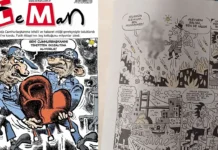Turkish authorities issued 46 censorship decisions, barring access to at least 1,401 URLs in January, which concerned news articles, social media posts and domains, the Free Web Turkey platform reported.
Of the 1,401 URLs, 972 contained news reports and 426 were social media posts, the report said.
The news articles and social media content primarily involved allegations of corruption and irregularities implicating public officials as well as people and organizations close to the ruling Justice and Development Party (AKP).
Censored news involved allegations that Deputy Justice Minister Ramazan Can sent human resources managers lists of candidates endorsed by the AKP; that former AKP deputy Fahrettin Poyraz was receiving salaries from 11 different positions; and that Boğaziçi University’s government-appointed and controversial rector Naci İnci had sold students and lecturers’ personal data.
Social media platform X announced the restrictions with an emphasis on the country’s upcoming local elections scheduled to take place in March.
The restricted posts also involved those that purportedly “threatened national security and public order.”
In addition to news articles and social media posts, three domains were censored in their entirety, including the website of the Kurdish-language Xwebûn newspaper as well as Jiangzaitoon, an LGBT-themed manga website.
Turkey had a score of 30 out of 100 points and was classified among the “not free” countries in the 2023 Freedom on the Net report published last October by the US-based nonprofit Freedom House.
The country was ranked 165th in the Reporters Without Borders (RSF) 2023 World Press Freedom Index, among 180 countries, not far from North Korea, which occupies the bottom of the list.















